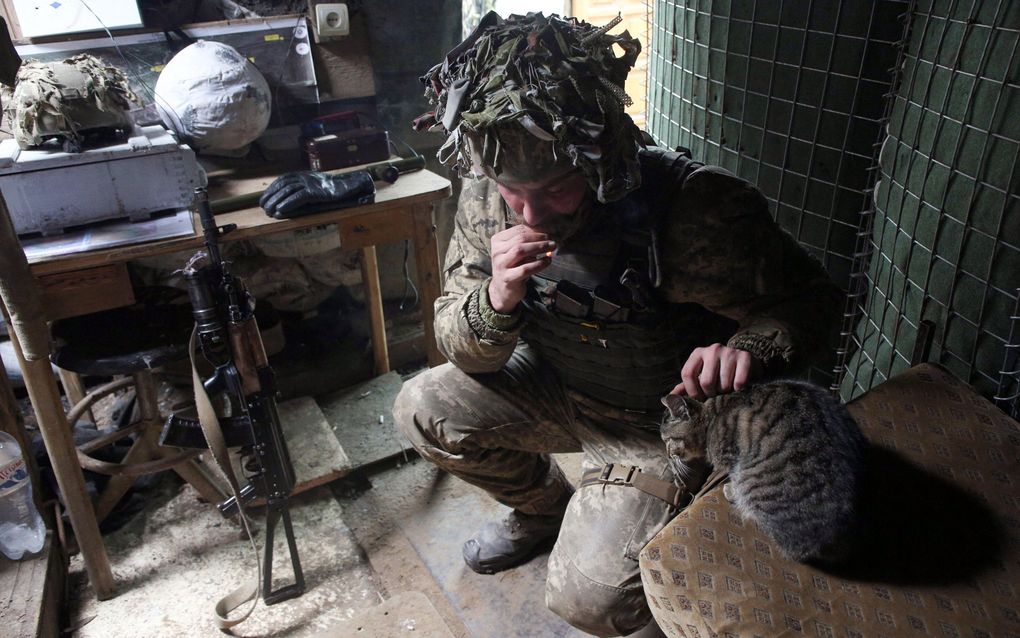Christians in Ukraine hold their breath or flee
10-01-2022
Eastern Europe
Klaas van der Zwaag, RD

A Ukrainian Military Forces servicemen, caresses a cat on a trench on the frontline with Russia-backed separatists near to Avdiivka, southeastern Ukraine, on January 9, 2022. Photo AFP, Anatolii Stepanov
Eastern Europe
Many Christians are leaving Ukraine. The threat from Russia is too significant to wait passively. "There is no good future with Russia. Russia will not make Ukraine a stable and prosperous country."
So says Vladimir Yakim, lecturer of Old Testament at Kyiv Theological Seminary. "We recently held several conferences on how to live during war and occupation. Sadly, we are forced to talk about such topics. Many of our neighbours are leaving the country, have their families move to the West and make wills in case they die."
Yakim says no one knows if Russian President Vladimir Putin will attack Ukraine. "We have been living in a war with Russia since 2014 –the annexation of Crimea–, and it is still causing casualties to this day. Moreover, we live in a state of information war. It means that all information coming from news media has to be critically analysed."

Prayer for peace
Tensions are rising, responds Pavel Unguryan, evangelical leader and chairman of the Conservative Movement of Ukraine. "Russia threatens not only Ukraine but all of Europe. The news of a possible war is occupying the whole country. However, all churches are united. We mobilise the churches in days of prayer and fasting. We want peace and freedom."
Churches are calling on people to pray for peace and God's guidance of the country amid an economic crisis. This response is typical of any denomination, Yakim said. "Leaders are not called to condemn anyone for leaving for the West, but to help those who stay in the country. In case of a war, church buildings will be open to provide assistance."
The events after 2014 have brought all churches closer together, says Dmytro Bintsarovskyi, visiting professor of theology in Kyiv and currently living in the Dutch city of Kampen. "There are many ecumenical meetings and interdenominational prayer groups." It is typical of Putin to escalate the situation, Bintsarovskyi said. "It is unpredictable, and I wonder if Putin himself knows what he is going to do. By escalating, he hopes to force concessions from Ukraine and the West to ban NATO expansion. So far, no serious concessions have been made, at least not publicly. I do not believe, however, that Russia is even considering conquering the entire territory of Ukraine. It is too risky and too expensive."

Now that NATO and the West have confirmed that there will be no military intervention, the light is green for intervention, responds Alister Torrens, rector of the Evangelical Reformed Seminary of Ukraine in Kyiv. "Putin has denied a few times that he will do so, but no one knows how this opportunistic leader will respond. However, like the vast majority in Ukraine, few believers, from any denomination, want the third largest army in the world to invade their country."

No guardian
Russia is sometimes seen as the guardian of the ancient Christian heritage (embodied by the Orthodox Church) against the secular West regarding family/marriage and sexuality. Yakim rejects that idea. "Russia is not considered a model of Christian lifestyle in Ukraine. The Christian climate is much better in Ukraine. Many students come from Russia to Ukraine to study theology, but not the other way around. Russia, especially its leadership, does not value human lives." Torrens says that the Kremlin likes to paint Europe and the West as morally corrupt. "At the same time, many of the same Russian politicians prefer to keep their money in Western banks and have their children educated in Western schools."
According to Bintsarovskyi, the Kremlin uses Russian orthodoxy to emphasise Russia's uniqueness and difference from the West. "However, Western secularism and Western Christianity are dismissed as alien to the Russian soul. According to Putin, Eastern Orthodoxy is even closer to Islam than Roman Catholicism. Protestants in Russia are still often regarded as American agents. Putin is not concerned with confronting the secular West, but the West itself.
This interview was published previously in the Dutch Reformatorisch Dagblad on January 8th, 2022


